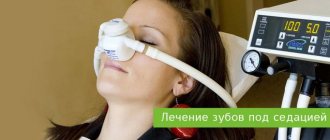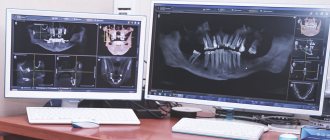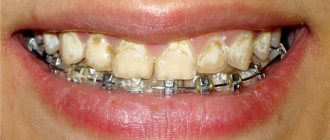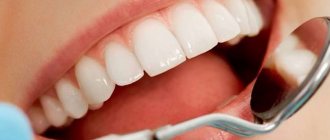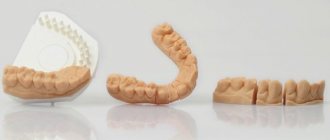27.11.2019
Pregnancy is a special period in a woman’s life, during which it is necessary to be most responsible and careful when using any medications. Especially those that can have a significant impact on the body of the expectant mother. These drugs include any painkillers used during anesthesia and anesthesia.
It is not surprising that many women are afraid to use anesthesia even for severe toothache, as they are not sufficiently aware of the safety of this procedure.
Therapy
| Service | price, rub. |
| Primary consultation and examination with a doctor | For free |
| Initial consultation with an implantologist, orthodontist, orthopedist (orthopantomogram is required) | For free |
| Examination by a doctor with prescription of medication | 500 |
| Help for antenatal clinics, hospitals, sanatoriums | 500 |
| TREATMENT OF CARIES | |
| Treatment of caries “without drilling” ICON technology – 1 tooth | 2500 |
| Treatment of caries (filling, anesthesia, lining) | 2400 — 3800 |
| Treatment of deep caries (filling, anesthesia, x-ray, lining) | 3000 — 4500 |
| Artistic tooth restoration (frontal group of teeth) | 4700 — 6350 |
| Restoration of a chewing tooth (filling, anesthesia, x-ray, pin) | 3000 — 4650 |
| NERVE REMOVAL – CANAL TREATMENT (depulpation) is carried out in two visits, payment in stages | |
| Treatment of pulpitis of a 1-canal tooth, without the cost of a filling | 3700 — 4800 |
| Treatment of pulpitis of a 2-channel tooth, without the cost of a filling | 5700 — 6800 |
| Treatment of pulpitis of a 3-channel tooth, without the cost of a filling | 7700 — 9800 |
| Treatment of pulpitis of a 4-channel tooth, without the cost of a filling | 9700 — 11000 |
| Installing a seal | 2800 — 3200 |
Initial consultation is free.
When can anesthesia be used?
Like any medical intervention, the unreasonable use of anesthesia during pregnancy is undesirable. There are cases when the problem can be eliminated without pain relief. For example, when treating superficial caries or low individual tooth sensitivity, treatment can be carried out without anesthesia.
The use of anesthesia for pregnant women becomes necessary in the following cases:
- Treatment of deep caries. As a rule, this disease is accompanied by acute toothaches and, if not treated in a timely manner, can lead to complications in the form of pulpitis and periodontitis. Inflammation of the dental pulp allows pathogenic bacteria to enter the bloodstream and spread throughout the body. To prevent their negative impact on the baby’s health, it is necessary to stop tooth decay in a timely manner.
- Removal of a tooth. If a tooth is destroyed and causes inflammation, bleeding and pain, it is recommended to remove it without waiting for the end of pregnancy. In this case, you also cannot do without the use of anesthesia.
Teeth cleaning
| Service | price, rub. |
| Initial consultation with a doctor | For free |
| Comprehensive professional hygiene (including ultrasonic removal of dental plaque, Air-flow, polishing, varnish coating) Promotion | 4000 3600 |
| Ultrasound removal of tartar – 1 tooth | 300 |
| Removal of pigment plaque with the “Air-flow” system – 1 tooth | 300 |
| Plaque removal using the Air-flow method – 2 jaws | 3000 |
| Ultrasonic dental plaque removal – 2 jaws | 3000 |
| Preventive fluoridation of teeth with GELATO – 2 jaws | 800 |
| Using the Optra Gate disposable retractor | 350 |
| Teeth whitening Opalescence Boost | 10000 |
| Skyce installation (including the cost of decoration) | 2000 |
All initial consultations are free.
Can pregnant women have their teeth treated with anesthesia?
Many ladies who are in an interesting situation wonder whether pregnant women are treated with anesthesia. This is not idle curiosity: doctors recommend at this time to refrain from any actions that could harm the unborn baby, at least theoretically.
But the condition of the fetus directly depends on the health of the mother, which cannot be considered at least satisfactory in the presence of serious dental problems. Is it worth delaying inevitable dental treatment until the postpartum period or enduring pain for fear of the negative effects of anesthetics? No you can not.
Vaccinations for pregnant women
In our country, where the anti-vaccination lobby is quite significant, any questions related to vaccination provoke wild holivar and groans.
In the list of “anti-vaccination” countries, according to the global public opinion survey State of Vaccine Confidence, Russia ranks third - 28% of the population does not trust vaccinations. France leads the ranking (41% of French people demonstrate a negative attitude towards vaccinations) and Bosnia and Herzegovina (36% of residents).
What can we say about the use of vaccines during pregnancy, when the medication load is usually minimized. The issue is so sensitive that the Lancet published a systematic analysis of the ethical issues surrounding vaccinating pregnant women.
Experts are confused by the lack of data on the possible risk to the developing fetus. Pregnant women are excluded from clinical trials, making it almost impossible to prove the safety of a particular vaccine. In reality, there is no specific risk for pregnant women. However, doctors, following the lead of anti-vaccination sentiments, are, if possible, easing the requirements for vaccinations for expectant mothers.
In our country, only seasonal vaccination of pregnant women against influenza is completely undisputed (in strict accordance with Federal clinical recommendations1 and the National vaccination calendar)2.
But live vaccines (measles, rubella, oral polio) are strictly contraindicated for pregnant women, so you don’t have to worry - no one will definitely vaccinate you with a “dangerous” live vaccine.
How to do it right
The most correct and logical approach is to carry out regular vaccination in accordance with the National Vaccination Calendar. Unfortunately, in real life, we much more often encounter patients who do not even think about carrying out preventive vaccinations, having left the strict care of the local pediatrician.
Issues of vaccine prevention for adults in our country are dealt with by local therapists and general practitioners (family doctors). However, remembering that saving drowning people is the work of the drowning people themselves, it is useful to take reasonable initiative.
The National Calendar strongly recommends that adults:
- diphtheria and tetanus - revaccination every 10 years throughout life;
- rubella - women from 18 to 25 years old (not sick, not vaccinated, vaccinated once against rubella, with no information about vaccinations);
- measles - adults under 35 years of age (not sick, not vaccinated, vaccinated once against measles, with no information about vaccinations);
- viral hepatitis B - adults from 18 to 55 years old, not previously vaccinated.
Information about vaccinations performed can usually be found in the outpatient card or in the vaccination certificate. Not only the date of vaccination is indicated, but also the series and number of the specific vaccine.
If a woman is planning a pregnancy, but there is no information about vaccinations, it is worth donating blood to determine specific antibodies - IgG to the causative agents of measles, rubella and, in accordance with the latest recommendations, to chickenpox, in order to be vaccinated as soon as possible, before pregnancy3.
What vaccines can pregnant women receive? International standards
Around the world, the issues of vaccination during pregnancy have been well studied and collected by the CDC (Centers for Disease Control and Prevention) in the final document - Guiding Principles for Development of ACIP Recommendations for Vaccination During Pregnancy.
Current promotions!
Implantation in installments regularly
The promotion operates regularly and applies to patients who require implantation.
When are pregnant women treated and have their teeth removed under anesthesia?
The pregnancy period is divided into three three-month periods - trimesters. Let's look at each of them in detail:
- I. In the first trimester, the foundation of the future little man is laid, so to speak. At this time, the main organs and systems of the fetus are formed. The placenta is not yet able to protect the fetus from negative external influences. The risk of miscarriage is high; any slightest stress can trigger it. The use of almost all medications in the first trimester is prohibited. During this period, it is not recommended to treat teeth in principle, much less with anesthesia.
- II. The placenta is already formed and is capable of protecting the fetus from many negative factors (which is what it is, in fact, intended for). The fetus already resembles a little man, as you can see on an ultrasound. The optimal time for dental treatment during pregnancy is the beginning of the second trimester: substances contained in anesthetics either do not pass the blood-brain barrier or penetrate to the fetus in minimal quantities.
- III. A woman’s body begins to slowly prepare for childbirth. All organs and systems of the fetus are already formed and are rapidly growing, and the placenta is exhausted, having fulfilled its purpose. The negative impact of anesthetics on the formation of the fetus is already minimal, but another risk comes to the fore: the likelihood of premature birth increases.
Conclusion: no doctor can rule out the possibility of a negative effect of anesthesia on the course of pregnancy and fetal development, so dental treatment and removal of eights should be done in advance: before planning a pregnancy. If treatment or removal must be carried out during pregnancy, then the best time is the second trimester.
In emergency cases, dental treatment under anesthesia can be performed at any stage of pregnancy - if there are absolute indications. These include acute pain, abscess, and phlegmon.
Photos of the dental offices of the clinic Our Dentist in Krasnogorsk
(images are clickable)
What painkillers are used during tooth extraction and treatment during pregnancy?
Standard protocols for the management of patients with caries, pulpitis and other dental diseases prescribe the use of local injection anesthesia. The use of general anesthesia and sedation is practiced in exceptional cases, and for pregnant women this is practically impossible.
So treatment (therapeutic or surgical) is carried out under local anesthesia, even during pregnancy.
Anesthesia is given to pregnant women when:
- treatment of deep caries,
- pulpitis,
- periodontitis,
- tooth extraction,
- opening an abscess,
- periosteotomy,
- in case of injury.
Most often, virtually harmless anesthetics without adrenaline or drugs with a minimum content of adrenaline are used for pain relief in pregnant women. The final choice remains with the doctor in each specific case, since only the doctor can assess the situation and choose the optimal drug.
The main rule for the use of anesthesia, like any other medication during pregnancy, is this: the drug can and should be used if the expected benefit to the mother outweighs the possible risk to the fetus.
Anesthesia, dental treatment and aggravating factors
Do not forget that many people suffer from allergic reactions, including to medications. A pregnant patient should definitely inform the doctor about all allergic reactions that she has ever had, even if this is not related to medications.
It is equally important to tell your doctor about all the features of your pregnancy:
- term,
- research results,
- high or low blood pressure,
- the presence of toxicosis,
- threat of interruption,
- swelling, etc.
Patients often believe that this is not important for dentistry, but not only the choice of anesthesia, but sometimes the treatment method will depend on your general condition.
So is it possible to have anesthesia or not? It's possible, but...
The question of whether it is possible for pregnant women to numb their teeth can be answered positively, but with some reservations regarding the choice of drug, the timing of pregnancy and the individual characteristics of the woman’s body.
The “Our Dentist” clinic is located in a young, promising area. Pregnant women and nursing mothers often turn to us for help. Our dentists know all the nuances of working with the most beautiful and delicate category of patients, which allows us to choose the optimal treatment tactics and gentle anesthesia drugs.
Our clients are satisfied with the treatment. They continue to visit our clinic regularly for many years, and many of them bring their children to our wonderful pediatric dentists!
Your calls are always welcome! 8 915-367-04-47 - call, make an appointment, come for a free initial consultation, and Our Dentist will become yours!
Dear patients! All prices on the site are valid only at the time of publication. The specialist will inform you about the exact cost and scope of necessary procedures after consultation.
Author of the material: Chief Dentistry Doctor “Our Dentist” Oleg Nikolevich Sharmay.
What painkillers can be used during pregnancy?
The use of general anesthesia is strictly contraindicated for pregnant women. During pregnancy, only local anesthesia is allowed. You can give painkilling injections in the following cases:
- With the correct selection of anesthetic and the absence of individual intolerance or allergies to the components of the drug.
- In the absence of adrenaline in the composition of the drug. Many anesthetics contain adrenaline, which leads to vasoconstriction. An increase in the concentration of adrenaline in a pregnant woman can lead to an increase in uterine tone and the risk of premature onset of labor.
- It is not recommended to give pain-relieving injections using Lidocaine. This drug is absorbed quite well and can easily penetrate the placenta into the child’s body.
Some of the safest painkillers used by dentists when treating the teeth of pregnant women are the drugs Ultracaine and Primacaine. These are special anesthetics that do not contain adrenaline and are not absorbed into the placenta, therefore they pose minimal risk to the baby’s health. There are other safe means. An experienced dentist will be able to select a drug depending on the individual characteristics of the patient.
If a pregnant woman is afraid of pain-relieving injections, you can pre-treat the gum area with a special gel.

